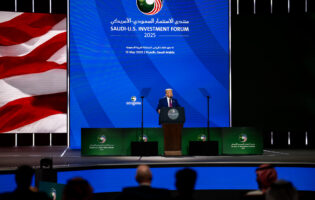AI generated image via Rawpixel
The Global Race to Regulate AI Is Just Beginning

Yixiang Xu
China Fellow; Program Officer, Geoeconomics
Yixiang Xu is the China Fellow and Program Officer, Geoeconomics at AGI, leading the Institute’s work on U.S. and German relations with China. He has written extensively on Sino-EU and Sino-German relations, transatlantic cooperation on China policy, Sino-U.S. great power competition, China's Belt-and-Road Initiative and its implications for Germany and the U.S., Chinese engagement in Central and Eastern Europe, foreign investment screening, EU and U.S. strategies for global infrastructure investment, 5G supply chain and infrastructure security, and the future of Artificial Intelligence. His written contributions have been published by institutes including The Chinese Academy of Social Sciences, The United States Institute of Peace, and The Asia Society's Center for U.S.-China Relations. He has spoken on China's role in transatlantic relations at various seminars and international conferences in China, Germany, and the U.S.
Mr. Xu received his MA in International Political Economy from The Josef Korbel School of International Studies at The University of Denver and his BA in Linguistics and Classics from The University of Pittsburgh. He is an alumnus of the Bucerius Summer School on Global Governance, the Global Bridges European-American Young Leaders Conference, and the Brussels Forum's Young Professionals Summit. Mr. Xu also studied in China, Germany, Israel, Italy, and the UK and speaks Mandarin Chinese, German, and Russian.
__
On February 2, ambassadors from all 27 EU member states approved the final text of the bloc’s landmark AI Act, advancing the world’s first comprehensive AI regulation further toward implementation. In the United States, the White House recently released a progress report detailing federal agency actions following President Biden’s October 2023 Executive Order (EO) that sets out the administration’s AI regulatory strategy. And despite scant progress on AI-related legislation in Congress, House Democrats and Republicans have worked together to form a new task force to tackle emerging challenges of artificial intelligence and its potentially destructive impact in parallel with Senate Majority Leader Chuck Schumer’s promised AI agenda.
In Washington, the sense of having to play catchup persists with no imminent rollout of a comprehensive regulatory framework. Facing continuing delays of new AI legislation, federal agencies are empowered by Biden’s EO to develop regulatory guidelines and assert enforcement authority. In Europe, attention has shifted toward the impact of carveouts necessary to pass the AI Act and the enforceability of the regulation with pending technical details and varying institutional capacities across 27 members. There are strong reservations from some member states that the AI Act may prove to be a serious drag on Europe’s innovative capacity.
Despite choosing different policy routes and traveling at their own speeds, both Washington and Brussels have repeatedly reaffirmed their optimism for bilateral cooperation on AI via platforms including the U.S.-EU Trade and Technology Council (TTC). The challenge to effective AI governance, it seems, lies outside the transatlantic bubble.
At a side event during the fifth TTC ministerial meeting, U.S. Commerce Secretary Gina Raimondo and European Commission Executive Vice President Margrethe Vestager jointly warned of the danger of China setting global standards for AI development and use. This shared alarm highlights the unquestioned belief in the democratic West that AI has already become a front of strategic competition. The technology’s potential to both inflict serious harm and bring about significant developmental benefits must be considered in the context of intensifying strategic competition and major global challenges.
China’s now well-established status as the main systemic rival for the United States and the EU demands a check on the country’s AI ambitions. Beijing’s design to make China into the world’s leading AI superpower is clearly stated in the government’s 2017 “New Generation AI Development Plan.” China’s Academy of Military Science (AMS) has a mandate to ensure “that the [People’s Liberation Army] PLA’s warfighting theory and doctrine fully capitalize on disruptive technologies like AI and autonomous systems.” The country already exports AI applications and infrastructures such as facial recognition and surveillance systems as well as smart city solutions, often linked to Beijing-sponsored infrastructure development initiatives and backed by Chinese financing. The United States harbors growing security and economic concerns about China’s export of unmanned arms, such as unmanned aerial vehicles (UAVs), and other AI weapon systems.
Calls from India and ASEAN to bring more developing countries into international AI governance discussions rightly channel policy attention to the economic consequences of AI innovation.
The values and political ideologies underpinning Chinese AI exports, so the thinking goes, conflict with Western democratic values on human rights and privacy and challenge the international security and economic orders the United States, the EU, and their allies seek to preserve. Thus, as many transatlanticists have advocated, the United States and the EU must lead global initiatives to establish international guiding principles and standards and, where possible, promote compatible regulations.
This, of course, sounds great. After all, one can point to the Global Partnership on Artificial Intelligence (GPAI) and the Hiroshima AI Process as early successes. The Bletchley Declaration even counts China among its signatories. But global consensus on the need to identify and contain risks does not mean countries will or should adopt similar regulatory practices. For one thing, shared values that made close TTC consultations possible are culture-specific. Local interpretations of basic human rights to privacy, equality, and non-discrimination, just to name a few, determine the bounds of AI applications and regulations on the ground. For example, commercial AI biometric applications, while viewed with great suspicion by the EU, are embraced by Asian democracies like Japan and Singapore, powering services ranging from vending machines to package delivery. The United States closely follows China as the second biggest exporter of facial recognition technology whose use is rising among U.S. police departments. The Association of Southeast Asian States (ASEAN) attaches great importance to countries’ cultural differences in the development of its guide to AI ethics and governance, acknowledging divergent national attitudes toward censorship, misinformation, public content, and hate speech, which are also key aspects of national security.
Many of ASEAN’s members, like developing countries elsewhere, are also far more interested in taking advantage of AI innovations to climb the global value chain. International initiatives championed by the United States and the EU, whether under the umbrella of G7 or the Organization for Economic Co-operation and Development (OECD) are dominated by developed countries and are not perceived by the global south to adequately address their needs, whether it is Delhi’s desire to bring benefits to its large population or Manila’s concerns of threats to its business process outsourcing industry. Thus, calls from India and ASEAN to bring more developing countries into international AI governance discussions rightly channel policy attention to the economic consequences of AI innovation.
AI’s impact on national security and the economy, along with global challenges like climate change, must be an integral part of Washington and Brussels’ global AI governance outreach. And these issues deserve to have dedicated forums and channels. Already, the White House has made the sensible decision to engage China in an AI safety dialogue, which could help to contain the proliferation of destructive AI applications to non-state actors and potentially set boundaries for state-sponsored use of offensive AI applications. On the economic front, domestic concerns over AI disruptions to the labor market or industrial competitiveness in the United States and Europe should not detract from demands from China and the global south to also benefit from a new, post-AI international trading system. Deployment of more assertive AI industrial policy at home also needs guardrails, preferably in the form of setting fair rules for market access and competition.
Additionally, the United States and the EU need to dedicate considerable resources to their global AI governance efforts beyond diplomatic outreach. Existing and potential partners vary in terms of digital capabilities, institutional capacities, regulatory efficacy, and rule of law. Investments, technical training, and legal assistance are necessary for many countries in the global south to implement agreed-upon AI principles. Reaching a global agreement on comprehensive AI development and deployment guidelines ought to be a huge milestone, but much more work lies ahead.









